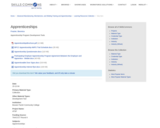
Apprenticeship Program Development Tools
- Subject:
- Career and Technical Education
- Material Type:
- Lesson
- Provider:
- SkillsCommons
- Author:
- Beonica
- Frazier
- Date Added:
- 05/15/2024

Apprenticeship Program Development Tools
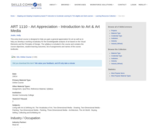
This entry-level course is designed to help you gain a general appreciation for art as well as to help you develop a working vocabulary for the knowledgeable analysis of art based on the Visual Elements and the Principles of Design. The syllabus is included in the course and contains the course objectives, student learning outcomes, list of assignments and names of the course textbooks.
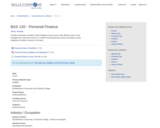
Provides information needed to make intelligent choices and to take effective action in the management of personal resources. Includes financial planning, buying, borrowing, saving, budgeting, investing, insurance, and taxes
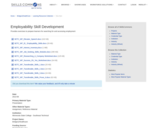
Provides exercises to prepare learners for searching for and accessing employment.
Interactivity Type: Active - requires user to respond to prompts, questions, etc.
Quality of Subject Matter was assured by:
-Consultations during development of instructional materials
-Participation as an ongoing member of team developing the instructional materials
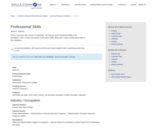
This is a two part mini course on Internship, Job Search, and Professional Skills in the Workplace. Part 1 covers internships & job search skills, while part 2 covers professional skills in the workplace.
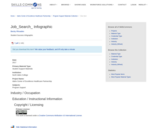
Poster with 5 tips for job searching
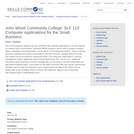
This course prepares students who are unfamiliar with computer applications to use the Internet for research and communication. Microsoft Office® programs will be used to prepare business letters, newsletters and spreadsheets. Focus will be on formatting and content. Please note that all course materials and content are provided in the IMS Common Cartridge (IMSCC) format. The content can be accessed by opening the IMSCC file using your organization's Learning Management System application (these include Blackboard, D2L, Canvas etc.). Additional information about accessing Common Cartridge files can be found on the IMS Global Web site: http://www.imsglobal.org/cc. Future plans for the Skills Commons Web site include a feature that will allow users to view and download course content that is provided in the IMSCC format. Please refer to the "Enabling Others to Reuse Your Materials” page for more information: http://support.taaccct.org/enabling-reuse/. Each IGEN Consortium college has established an Industry Advisory Group as part ...
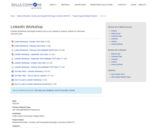
LinkedIn Workshops that taught students how to use LinkedIn to network, prepare for interviews, and land a job!
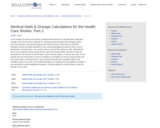
n this module you will learn the basics of Medical Math and how to calculate basic medication dosages. We cover the three methods for calculating simple dosages from physician orders: ratio and proportion, dimensional analysis and simple formulas. These files are SCORM packages and can be easily uploaded to your Learning Management System (LMS), such as Blackboard or Desire2Learn. If you want to view or use the files without an LMS, download the files to your computer, extract (unzip) the file, open the extracted folder, and click to open the story.html file. The booster or test will open in your browser window. If used on your LMS, for the booster, the user will be given a score of complete or incomplete; for the pre and post-tests, the user will be given a numerical score. This scoring functionality and completion data is only available if used on an LMS. The SCORM packages are complete and not available for editing. If you would like to include additional information, consider adding the content before or after the booster on your LMS.

In this module you will learn the basics of Medical Math and how to calculate basic medication dosages. These files are SCORM packages and can be easily uploaded to your Learning Management System (LMS), such as Blackboard or Desire2Learn. If you want to view or use the files without an LMS, download the files to your computer, extract (unzip) the file, open the extracted folder, and click to open the story.html file. The booster or test will open in your browser window. If used on your LMS, for the booster, the user will be given a score of complete or incomplete; for the pre and post-tests, the user will be given a numerical score. This scoring functionality and completion data is only available if used on an LMS. The SCORM packages are complete and not available for editing. If you would like to include additional information, consider adding the content before or after the booster on your LMS.
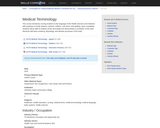
This course introduces nursing students to the language of the Health Sciences and medicine with emphasis on body systems, prefixes, suffixes, root terms, and spelling. Upon completion, students will be able to analyze words structurally and demonstrate a correlation of the word elements with basic anatomy, physiology, and disease processes of the body.
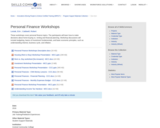
These workshops cover personal finance topics. The participants will learn how to make decisions about home buying vs. renting and financial planning. Workshop discussions will include budgeting, basics of investment fundamentals, and basic economic principles, such as understanding interest, business cycle, and inflation.
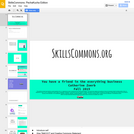
This is a short presentation on SkillsCommons.org, an open library of industry specific materials for community colleges. SkillsCommons is funded by the Department of Labor's TAACCCT grant.
PechaKucha Edition
I wrote this in PechaKucha form, which means that each slide is only meant to be discussed for 20 seconds. Mine is slightly modified, as I do not have quite 20 slides, but that can always be modified for your purposes!
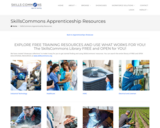
EXPLORE FREE TRAINING RESOURCES AND USE WHAT WORKS FOR YOU! The SkillsCommons Library FREE and OPEN for YOU!
We have created “showcase collections” to make it easy for you to get started finding and using SkillsCommons’ resources. You can search the entire library of FREE and OPEN EDUCATIONAL RESOURCES at www.skillscommons.org
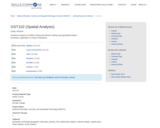
Introduces students to problem-solving and decision making using geospatial analysis techniques, applicable to a range of disciplines.
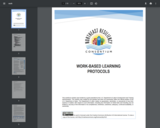
WBL Protocols is a standard set of tools and processes that are responsive to student and employer needs and reinforces the idea that developing such experiences is both very important and requires real work by professionals who approach their work in a well organized way. This document’s primary aim is to share NRC’s experiences with practitioners in colleges and workforce development organizations who are interested in developing quality WBL programs for their students. It defines not only the roles and responsibilities of all parties involved in the process, but also the elements of quality program planning, implementation, and evaluation. It also illustrates how WBL is executed in the NRC colleges and provides useful tools and templates.
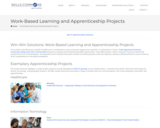
Win-Win Solutions: Work-Based Learning and Apprenticeship Projects
From aviation manufacturing in Seattle to health care in rural Montana, many community colleges have used their U.S. Department of Labor’s Trade Adjustment Assistance Community College and Career Training (TAACCCT) grants to develop work-based learning (WBL) opportunities. These WBL activities—where “classroom” learning is paired with activities that occur at the workplace—are designed to train and place thousands of adults into well-paying jobs, while also helping to develop a skilled workforce to ensure American firms’ competitiveness in the global marketplace.
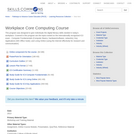
This program was designed to give individuals the digital literacy skills needed in today's workplace. Covered in this program are the topics tested on the internationally recognized IC3 exam - Computer Fundamentals (Computer Basics, hardware/software, networks); Key Applications (MS Office Suite); and Living Online (using the Internet effectively for research and communication).